Friday, March 31, 2006
Well, Midnight is the Deadline
Thursday, March 30, 2006
Wrong side of the bed?
Where, when, and in what context he said these things I have no idea. I hate it when I read an article and come away knowing less than I did going into it, but it happens all too often. I still really want to read A House for Mr. Biswas, though.
NYTimes misleads on NSA story
Wednesday, March 29, 2006
The Iraqi documents are good for the NYTimes
Good grief
Tuesday, March 28, 2006
Straight out of thunderdome
Iraq could be the model for economic reform in the region
A table concerning GDP in the report:
Year - GDP in billions
2002 - $20.5
2003 - $13.6
2004 - $25.5
2005 - $29.3
Monday, March 27, 2006
Stephen Hayes studies the Iraqi documents so the rest of the media doesn't have to
"There was no terrorism in Iraq before we went there," said Murtha. "None. There was no connection with al Qaeda, there was no connection with, with terrorism in Iraq itself." This is now the conventional wisdom on Iraq and terrorism. It is wrong.
...
John Murtha's claim--that there was no connection "with terrorism in Iraq itself"--might come as a surprise to the 2nd Battalion, 23rd Marines. In early April 2003, they found a ten-acre terrorist training camp ten miles outside of Baghdad. In an interview at the time with an embedded reporter from Stars & Stripes, Captain Aaron Robertson said: "We believe this is a training camp where Iraqis trained forces for the Palestine Liberation Front. This is what we would refer to as a sensitive site. This is clearly a terrorist training camp, the type Iraq claimed did not exist."
Sunday, March 26, 2006
Looks like there is a sanity clause
Saturday, March 25, 2006
Buck Owens is Gone Now

In my experience, the music of Buck Owens and the Buckaroos was almost universally enjoyed. Whether I was at a rock concert, or listening to a reggae, country, or goth band, whatever the hipness of the crowd, whenever the Buckaroos played between sets or during the interim, we all felt at home. Buck's music will work at almost any sort of party. He will be missed. R.I.P.
Is Madeleine all that bright?
The “good vs. evil” equation was never presented as a strategy, as Albright believes. It’s an assessment. So from the very headline of her article, there is a basic question of comprehension on her part. What can you make of a person that doesn’t understand the difference between “strategy” and “assessment?” If you realize something is an assessment, why criticize it as a strategy?
Since Albright rejects “good vs. evil” as a strategy, we’ll assume she would also reject it as an assessment. Why? Because it’s oversimplified, of course! That’s the vein in which she rejects everything from the administration. In her Clintonian noodle, she thinks it fine to spout off about “good vs. evil” as empty rhetoric, but try to use it to form policy and she’s against it. Yet, if you can’t distill broad realities into simplified workable terms, then you can forget about solving any problems, which brings me to my second point. Having experience on the inside, you’d think Albright would recognize the squirrelly nature of alliances. But not so:
“For years, the president has acted as if Al Qaeda, Saddam Hussein's followers and Iran's mullahs were parts of the same problem.”
She goes on to relate how each of these entities have fought or disagreed with each other in the past. True. But is she arguing that alliances between these groups are impossible or even unlikely? If so, she’s disregarding some of the clearest lessons of history. As an example, I would cite about every country that had an alliance or an agreement with the Soviet Union in the 20th century: the U.S., China, Nazi Germany, you name it. Each had fundamental disagreements and issues of distrust with the Soviets, not to mention blood feuds. Yet, that didn’t stop anyone from making deals with the Red menace. Alliances are not formed as a reflection of past differences, but rather of current and future aims. I hope Albright knew as much when she was in the State Department. To believe that Saddam would never have an agreement with Iran or al Qaeda or vice versa displays the worst and most dangerous sort of naivete that could exist – and it’s a pity that such a belief enjoys any credence at all in our national discourse.
If Mrs. Albright could shuck away the erroneous notion that Bush is a simpleton who only sees things in black and white, she might realize that al Qaeda, Baathists, and the mullahs are, indeed, parts of the same problem, albeit a broad and big problem.
Albright rejects the term “axis of evil”. No doubt, she believes it, too, is oversimplified and false. But claiming that N. Korea, Iraq and Iran formed an axis of evil is not the same as saying that the three countries have uniform national interests. To take it as such is to commit the crime of oversimplification. However, there is a difference between her simplification and Bush’s simplification: Bush’s simplification provides a framework with which to define and address the problem. It has constructive uses. Albright’s simplification serves no constructive purpose. In fact, it eliminates any possibility of constructing a workable framework because it rejects the very notion of simplification.
In addition, the idea that the axis of evil is a Bush “invention” rather than an already existing reality that Bush merely identified with a name is preposterous. It makes me wonder what the world would have been like after an additional four years of Secretary Albright. I shudder.
“When the U.S. invaded Iraq, Bush may have thought he was striking a blow for good over evil, but the forces unleashed were considerably more complex.”
A blow for good over evil can’t be complex? Ridiculous. By her reasoning, we are in a far worse condition to respond to Iran. Has she looked at a map? Three years ago, we were in a weaker stance. Now look: we have a stretched our military, true, but they are already deployed to the region and surrounding Iran. Our military had three extremely valuable years of experience in fighting – four when you include Afghanistan. They’ve learned from mistakes and honed their skills. If those things are lost on Albright, they aren’t lost on the mullahs.
Ironically, the sub heading on her article claims that Bush doesn’t see that power politics is key. The power politics she’s referring to is with the Shia. She seems oblivious to U.S. political power in the region and what it has already achieved. Bush is mindful of the Shia – he’s working with them and not “playing solitaire” as Albright claims. One of the most frustrating things about the left’s view of what’s going on in Iraq is that they don’t believe we have a political strategy. Why is it frustrating? Because it’s the most visible and tangeable aspect of victory in Iraq. To listen to Albright or Kerry or Reid, you’d think that Bush had nothing to do with the Iraqi interim government or the constitution or the permanent government. And if they do give him the nod on those things, you can bet it’s to accuse him of fostering an Iranian style theocracy in Iraq. Maddening.
Albright says that we helped elect Iranian allies to power in Iraq. So what? Were the Iraqi Shia friends with Iran because the mullahs were so likeable? Or was it because Hussein left them little choice? The argument that the Iraqi Shia will do the Iranian bidding is not likely. Again, I would refer to the squirrelly nature of alliances. Iraqis will have relations with Iran, and that’s a good thing. But politically, the Iraqi Shia have displayed wisdom in governing thus far. Along with the Kurds, they’ve shown much patience with the Sunnis. The stronger and more stable Iraq gets, the less advantage will there be for the mullahs to enjoy. Iranian influence on Iraq is mainly in the form of IEDs and foreign fighters. That’s short term stuff. When Iraq is on its feet and the currents of influence turn the other way, it will be long term stuff, like freedom, liberty and prosperity – words that make the left cringe. Iraq and Iran are going in two different directions. Albright should recognize that.
Her three suggestions:
"The first is to understand that although we all want to "end tyranny in this world," that is a fantasy unless we begin to solve hard problems. Iraq is increasingly a gang war that can be solved in one of two ways: by one side imposing its will or by all the legitimate players having a piece of the power."
Either way, we win. Still, she’s a little late on this advice. As mentioned earlier, Bush has already laid a foundation in which the Iraqis have formed a coalition government. He set the board, and now it is Iraqis who are hashing it out and forming the stable government. It’s a perfect example of how Bush knows when to intervene and when to sit back and let folks work out their own solutions. That Albright even makes this suggestion is an example of how Democrats refuse to acknowledge any progress or success by our President.
"Second, the Bush administration should disavow any plan for regime change in Iran — not because the regime should not be changed but because U.S. endorsement of that goal only makes it less likely."
Come now, Albright, any plan? Bush is damned if he has a plan and damned if he doesn’t. There’s a small element of truth in her line of thinking, but I’m not convinced that Albright appreciates it. Sometimes it does pay to not step forward with an agenda – yet, the best way to undermine and demoralize the pro-democracy elements in Iran is to disavow any plan for regime change.
"Third, the administration must stop playing solitaire while Middle East and Persian Gulf leaders play poker."
Toss this rhetoric in with the “go it alone” junk pile. The reality is that the U.S. has been working with all the countries in the region. We’re playing hard and making demands, but that’s just power politics, something Albright thinks we shouldn’t play, though, according to her, that’s what it’s all about.
Let me end by refering to Iraq and 9/11 in the same sentence. It’s clear that Albright still prefers the artificial stability of the 90’s, but that world is long gone, and good riddance. The U.S. invaded Iraq because the status quo was unacceptable and we simply did not have enough World Trade centers to destroy to keep the Middle East satisfied.
Thursday, March 23, 2006
China wants to develop an animation industry
A room full of monkeys typing randomly at computers for a million years
Question: You’re a Christian Anti-War organization with members operating in Iraq
Answer: You don’t.
Mark Steyn throws some cold water in the face of the defeatist crowd
…"Mr. President," Joe Biden, the Democrat Senator and beloved comic figure, condescendingly explained to Bush Jr. in 2002, "there is a reason your father
stopped and did not go to Baghdad. The reason he stopped is he didn't want to be
there for five years."
By my math, that means the Americans would have been out in spring of 1996. Instead, 12 years on, in the spring of 2003 the USAF and RAF were still policing the no-fly zone, ineffectually bombing Iraq every other week. And, in place of congratulations for their brilliant "containment" of Saddam, Washington was blamed for UN sanctions and systematically starving to death a million Iraqi kids - or two million, according to which "humanitarian" agency you believe. The few Iraqi moppets who weren't deceased suffered, according to the Nobel-winning playwright and thinker Harold Pinter, from missing genitals and/or rectums that leaked blood contaminated by depleted uranium from Anglo-American ordnance. Touring Iraq a few weeks after the war, I made a point of stopping in every hospital and enquiring about this pandemic of genital-less Iraqis: not a single doctor or nurse had heard about it. Whether or not BUSH LIED!! PEOPLE DIED!!!, it seems that THE ANTI-WAR CROWDS SQUEAK!!! BUT NO RECTUMS LEAK!!!!
A NEW study by the American Enterprise Institute suggests that, aside from the terrific press, continuing this policy would not have come cheap for America: if you object (as John Kerry did) to the $400-600 billion price tag since the war, another three years of "containment" would have cost around $300 billion - and with no end in sight, and the alleged death toll of Iraqi infants no doubt up around six million. It would also have cost more real lives of real Iraqis: Despite the mosque bombings, there's a net gain of more than 100,000 civilians alive today who would have been shoveled into unmarked graves had Ba'athist rule continued. Meanwhile, the dictator would have continued gaming the international system through the Oil-for-Food program, subverting Jordan, and supporting terrorism as far afield as the Philippines.
…..
….The slavering western media keep declaring a civil war every 48 hours but those layabout Iraqis persist in not showing up for it.
True, there's a political stalemate in Baghdad at the moment, but that's not a catastrophe: if you read the very federal Iraqi constitution carefully, the ingenious thing about it is that it's not just a constitution but also a pre-nup. If the Sunni hold-outs are determined to wreck the deal, 85% of the Iraqi population will go their respective ways creating a northern Kurdistan that would be free and pro-western and a southern Shiastan that would still be the most democratic state in the Arab world. That outcome would also be in America's long-term interest. Indeed, almost any outcome would. In 2002, Amr Moussa, Secretary-General of the Arab League, warned that a US invasion of Iraq would "threaten the whole stability of the Middle East." Of course. Otherwise, why do it?
He goes on. It’s a nice companion piece to some statistics that were being circulated on the blogosphere yesterday regarding the military casualty rates of the last few presidents.
UPDATE: I noticed Hugh linked to Steyn's math. I like to think that the greatest living columnist was inspired by my Chomsky calculator - which I've been using for years - but oh, well.
Tuesday, March 21, 2006
Buddha boy is back? What? He's missing again?
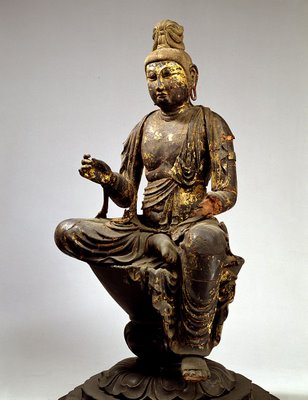 And when it comes to Buddhist art, I like mine to be Japanese, like this piece from the Nara period (8th century). That's not to say that other Buddhist art is not great, it is. I remember touring a Tibetan Buddhist gallery at a museum in Shanghai. Great stuff. I'm not a Buddhist expert and the lines between Buddhism and Hinduism in that gallery seemed hopelessly blurred to this westerner. I saw female Buddha's (they could've been Devas) with six arms and legs spread eagle. That's great when I want my religious art to clean my pipes, but a little disturbing when I'm looking for solace. The Japanese style (still heavily influenced by Indian art) is less sex and more meditation.
And when it comes to Buddhist art, I like mine to be Japanese, like this piece from the Nara period (8th century). That's not to say that other Buddhist art is not great, it is. I remember touring a Tibetan Buddhist gallery at a museum in Shanghai. Great stuff. I'm not a Buddhist expert and the lines between Buddhism and Hinduism in that gallery seemed hopelessly blurred to this westerner. I saw female Buddha's (they could've been Devas) with six arms and legs spread eagle. That's great when I want my religious art to clean my pipes, but a little disturbing when I'm looking for solace. The Japanese style (still heavily influenced by Indian art) is less sex and more meditation.A little background on this dude: his name is Nikko Bosatsu. He's the Bodhisattva of Sunlight. His sibling, Gakko (no pic) is the Bodhisattva of Moonlight. These two attended Yakushi Nyorai, the Buddha of medicine. Of course, these characters originated in Nepal, and I believe Yakushi Nyorai was one of the first Buddha's to hit the shores of Japan.
Nara was the first permanent capital in Japan. Previously, the capital had moved with the passing of each emperor - so as to avoid spirits from dead ancestors. I think this practice ended as a result of Buddhism's growing influence. The Nara period lasted less than a century (710-784) before the royal family settled in Kyoto for a millenium. Although the emperor's lineage relied on Shintoism, Buddhism became very prominent in the court. Shintoism remained the religion of the farmer and laborer and Buddhism was prominent among intellectuals. Confucianism was the main influence on Nara's legal code.
President Bush at the press conference
Here's today's press conference. Here he is talking about the censure "movement":
QUESTION [Carl Cameron?]: not to change the tone from all this emphasis on bipartisanship, but there have been now three sponsors to a measure to censure you for the implementation of that program. The primary sponsor, Russ Feingold, has suggested that impeachment is not out of the question. And on Sunday, the number two Democrat in the Senate refused to rule that out pending an investigation. What, sir, do you think the impact of the discussion of impeachment and censure does to you and this office, and to the nation during a time of war, and in the context of the election?
THE PRESIDENT: I think during these difficult times -- and they are difficult when we're at war -- the American people expect there to be a honest and open debate without needless partisanship. And that's how I view it. I did notice that nobody from the Democrat Party has actually stood up and called for getting rid of the terrorist surveillance program. You know, if that's what they believe, if people in the party believe that, then they ought to stand up and say it. They ought to stand up and say the tools we're using to protect the American people shouldn't be used. They ought to take their message to the people and say, vote for me, I promise we're not going to have a terrorist surveillance program. That's what they ought to be doing. That's part of what is an open and honest debate.
I did notice that, at one point in time, they didn't think the Patriot Act ought to be reauthorized -- "they" being at least the Minority Leader in the Senate. He openly said, as I understand -- I don't want to misquote him -- something along the lines that, "We killed the Patriot Act." And if that's what the party believes, they ought to go around the country saying we shouldn't give the people on the front line of protecting us the tools necessary to do so. That's a debate I think the country ought to have.
Indeed.
Japan's military in transition
Monday, March 20, 2006
"I think Ernst Lubitsch was the greatest movie director who ever lived, with Akira Kurosawa following close behind."
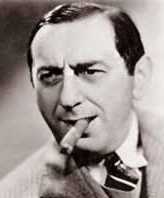 Wagstaff: If Kurosawa could put away his Japanese humility for a moment (and not insist that John Ford and countless others are his superiors, too) - he would likely agree. I'd include Ozu as right behind Lubitsch, too, but Lubitsch is still the greatest. Nobody matches him in creating the film language, maintaining a prolific, extremely high consistency or generating film magic.
Wagstaff: If Kurosawa could put away his Japanese humility for a moment (and not insist that John Ford and countless others are his superiors, too) - he would likely agree. I'd include Ozu as right behind Lubitsch, too, but Lubitsch is still the greatest. Nobody matches him in creating the film language, maintaining a prolific, extremely high consistency or generating film magic.
Sunday, March 19, 2006
3 Years in Iraq: a war that is saving lives?
Update: sorta related. Since I poke fun at Fareed Zakaria a lot, I figured I'd link a column of his that I thought was good, especially the summation.
Update 2: Gateway lists some missed predictions.
Saturday, March 18, 2006
Wagstaff Manifesto
Politically, I would label myself as a forward-thinking 19th century liberal.
Today, that passes for a Man of the Right.
If there can be such an animal that melds the philosophies of David Hume and St. Thomas Aquinas, of Adam Smith and G.K. Chesterton, then I am that animal.
I think that the government should stay out of the bedroom, and just as important, vise versa.
I don't care about the federal deficit.
I believe a singular, objective truth exists that is larger than any one man, and therefore he views things subjectively. The opposite would be not believing in any singular, objective truth but trying to view things objectively.
I believe Jesus loves gay people.
I never met a person who didn't impress me with at least some kind of intelligence.
I believe human life begins at conception. You might think that is a leap, but I think believing anything else is even more of a leap.
I think Henry James is a great novelist.
I think the Bill of Rights is listed in order of importance.
In a sense, I think western literature after Homer and the Bible is all downhill.
I think that a goose-stepping army is always bad news. Never trust an army that goose-steps.
I think that any song, no matter how awful, can be used effectively in a movie.
I give thanks to God for Martin Luther King Jr.
I love Bob Dylan as a vocalist.
I read Catcher in the Rye when I was a teenager and I didn't relate to it at all.
I support every american war whether I agree with it or not. That is my carefully thought-out knee-jerk position.
I think you can be smarter than the average person, but you will never be smarter than ten average persons.
I think that every modern pop song is one minute too long.
I think that our current President is a lot smarter than anyone who calls him stupid. Yes, that means you.
I believe abortion is an abomination that should be restricted in most cases. I don't know how to do this.
I think Percy Shelley was a great poet, but in the battle of ideas between Shelley and Thomas Love Peacock, I side with Peacock.
I think a ruler who wears the same outfit every day is always bad news. Never trust a ruler who cultivates his own iconography.
I believe the South deserved to get thumped in the Civil War.
I think that generals Grant and Sherman were lovely, humane men.
I believe that if the material universe is in a state of entropy, then our mental universe is in a state of reverse entropy.
I think that the tendencies, prerogatives, and imperatives of each branch of the federal government will usually trump partisanship.
I think Ernst Lubitsch was the greatest movie director who ever lived, with Akira Kurosawa following close behind.
I think many of the greatest critics have been conservatives, but most conservatives make lousy critics.
I think that whether you believe in it or not, the story of Jesus in the gospels is by far the strangest, most original tale told by man.
I believe that sometimes it is just plain common sense to run with the herd.
I think it is not what you know, or who you know, but what other people think you know.
I believe that when Rome defeated Carthage in the Punic Wars, the good guys won.
I believe that Christianity as a religion makes the most sense. It also makes the most nonsense.
I think the best thing I ever heard about Franklin Delano Roosevelt came from Conrad Black, who said "third rate economics, first rate catastrophe avoidance."
I like what Winston Churchill said about supporting the church, but from the outside, like a flying buttress.
I think George W. Bush's foreign policy is profoundly unconservative.
I think a great thing about conservatism is that you don't have to be smart.
I don't think ratings codes and content advisory stickers constitute censorship.
I think pot should be legalized and probably all other narcotics as well.
I think you are fooling yourself if you think prolonged reefer smoking doesn't make you dumber.
I think if you can't make your opponent's argument better than he can, then you are losing the argument.
I think generations these days look back on the 50's as a period of normalcy we have deviated from or outgrown, but really the postwar consensus was one of the most abnormal periods imaginable.
I think most of the U.S. congress is a bunch of spineless boobies.
I think the most important fact about early cave paintings is that it was man who painted the animals and not the other way around.
I am not a purist of any kind. I keep my ideals pure only in the Platonic realm of ideas and not here on earth.
I am not a Platonist.
I think Aristotle was one of the smartest, most logical men ever to have walked the earth. He wrote the book on secular ethics.
I am not as smart as Aristotle.
Aristotle defended slavery as a matter of course.
I am a fool who flatters himself if I think I could have figured out slavery was evil on my own.
I think that Norman Rockwell was a great painter.
I believe the Iraq War is a war of necessity.
I am far more likely to be annoyed with Republicans and conservatives than I am with the President.
I believe marriage is marriage, but that we should have civil unions for everyone.
I support the President in most of what he does. I know that I don't have to.
I think that low voter turnout must mean things are O.K.
I think that just because your gay friend gave you fashion advice, it doesn't mean that it was good advice.
I believe that the deity might be looking at us through a one-way mirror.
I believe that becoming a Christian can be no easy comfort, on the contrary, it must stand as life's thorniest challenge.
I think you should forget about what modern critics say about Don Quixote being a loveable, foggy-eyed idealist. The book is brutal slapstick and that crazy son of a bitch is dangerous.
I think that Senator Joseph McCarthy was an ass.
I think that what Edward R. Murrow and the gang at CBS did was indeed a noble thing and good for the country, but what it wasn't was good journalism.
I think that the japanese internment camps during WWII were unconstitutional, but they might have been a better deal for japanese-americans than the alternatives.
I think it is a bad idea to try to hook Jr. High and High school students on reading by assigning them stories and plays that climax with mental breakdowns and suicide. What the hell are they thinking?
I believe that people will complain to those who listen; to those who don't listen they won't complain.
I think that military history should be part of the basic curriculum at every public High school.
I think that people who like pornography shouldn't worry. The government is never going to take your porn away.
I have never voted for a Democrat in my life, but I would vote for Joe Lieberman.
I think if you believe that a certain book, t.v. show, movie, music ect. can have a positive influence on someone's life, then you must also believe that a certain book, t.v. show, movie, music ect. can have a negative influence on someone's life.
I think that if history teaches us nothing else, it teaches that mankind abhors a power vacuum. If you have power and don't maintain the fight to keep it, there will always be someone in the wings ready to move in, single minded and with their eye on the ball.
I believe you should never write a letter to someone when you are drunk. You'll regret it.
I think that if you have ever seen something depicted by the media that you knew about or were involved in personally, then you will know that they got a lot of it wrong, therefore I think it is a safe assumption that they get a lot wrong when you see them depict something you don't know about or weren't involved in personally.
I believe we are all sinners, that is for damn sure.
Confucius defined wisdom as "To say you know when you know, and to say you don't know when you don't know." This sounds so simple, but it is difficult as all hell.
Friday, March 17, 2006
Two Chinese snowscapes...
The first one is from Sun Jun-ze during the Yuan Dynasty (1280-1370). You'd think that Mongol hordes could ruin a culture, but they didn't, at least not judging by this kickingly serene pavilion. Chinese art has a way of layering backgrounds in such a manner as to create the absence of depth. It's not flat, but airy and flat. Very exotic...

The second snowscape is from the previous Song Dynasty (10th-13th century) by Liang Kai (1279). The Song dynasty was a docile empire that eagerly shed any interest in maintaining a strong military, making it vulnerable to Mongol aggression down the road. That it lasted so long is a testament to the strength of Chinese culture and institutions. It's one of my favorite dynasties (which explains why I'm blogging on a Friday night), but I digress. Here we have two riders swallowed up in an immense but non-threatening nature.

If it walks like a Nazi and acts like a Nazi...
 On the right side, near the Nazi's boots - see it? Here it is in a different light:
On the right side, near the Nazi's boots - see it? Here it is in a different light: That's the symbol that forced God to make the little mouse do this:
That's the symbol that forced God to make the little mouse do this: So He could burn the swastika.
So He could burn the swastika. Your honour: evil.
Your honour: evil.
Curious
I could very well be reading too much into this delay/omission, but it does seem odd. Are these papers holding back in order to verify authenticity and translations, etc.? Such thoroughness hasn’t slowed these papers down before. I know the Washington Post’s stance on the WMD issue is that they should have questioned their existence in the first place. I’ve always felt that they drew the wrong conclusion. The question shouldn’t be if the WMDs existed so much as what became of them, but that’s just me, a fellow who believes in the quaint idea that matter is neither created nor destroyed. Still with the Post’s stance (something I would assume is shared by the NYTimes and the LA Times), it seems like they would approach this newly released material with more urgency. Who knows what the documents will reveal, but the curiosity should be there, right? What gives?
Thursday, March 16, 2006
French students protest new labor law
"They're offering us nothing but slavery," said Maud Pottier, 17,That's fine, Maud, now go get your shine box.
a student at Jules Verne High School in Sartrouville, north of
Paris, who was wrapped in layers of scarves as protection
against the chilly, gray day. "You'll get a job knowing that
you've got to do every single thing they ask you to do because
otherwise you may get sacked. I'd rather spend more time
looking for a job and get a real one."
Feed the duck!
Wednesday, March 15, 2006
As the pretzels twist
Obama: "I haven't read it."
Ben Nelson: "I just don't have enough information."
Kerry: "I really can't right now."
Clinton: “…” [sound of wind as she darts past reporters]
Schumer [pointing to Reid] "He's gonna talk about it."
Reid: "It's a question that's been asked 33 times in the last few hours," he said. "And so, for the 34th time, I'm going to say the same thing: I'm going to wait . . .''
I haven't seen so many tails tucked between so many legs in the Senate since....well, since the PATRIOT Act was renewed, 89-10.
Tuesday, March 14, 2006
This stout little bovine dude...

Massive infiltration thwarted?
A report on the AP
"How’s this for an example of bias from the Associated Press?
WASHINGTON (AP) Republican Legislators did not rebel against George W. Bush when he justified the Iraq war with false intelligence information. Neither did they do so when they learned that the NSA was spying on American citizens without warrants.
But an apparently insignificant measure provoked a mutiny in the ranks: authorizing a Dubai company to manage the operations at six US ports.
That’s straight out the Michael Moore wing of the Democratic Party. What’s it doing in an AP report? Why have the bloggers who make a living dissecting media bias not descended on the AP? Because the only format in which that AP story appears looks like this:
WASHINGTON (AP) _ Los legisladores republicanos no se rebelaron contra el presidente George W. Bush cuando justificó la guerra en Irak con informes falsos de inteligencia. Tampoco lo hicieron cuando se supo que la Agencia de Seguridad Nacional espiaba a los ciudadanos sin orden judicial.
Pero una medida aparentemente de poca importancia provocó un motín en regla: autorizar a una compañía de Dubai a manejar las operaciones en seis puertos de Estados Unidos."
Sunday, March 12, 2006
Ugh! The Spectator & Sunday Telegraph drop the greatest living columnist
 I had noticed that Mark Steyn's Thursday Spectator piece had been missing lately - but didn't think anything of it. Technically, it looks like he's no longer syndicated in the U.K. I hope Mr. Steyn knows he can contribute to Liverputty as much as he wants (something he does regularly, whether he knows it or not.) - news via Ace, photo via Chicago Sun Times
I had noticed that Mark Steyn's Thursday Spectator piece had been missing lately - but didn't think anything of it. Technically, it looks like he's no longer syndicated in the U.K. I hope Mr. Steyn knows he can contribute to Liverputty as much as he wants (something he does regularly, whether he knows it or not.) - news via Ace, photo via Chicago Sun Times
Saturday, March 11, 2006
Friday, March 10, 2006
Winchester '73
 The second installment of the Anthony Mann series is actually the first collaboration between Jimmy Stewart and Mann. Winchester ’73 is everything that Wagstaff charges that The Far Country is not – fresh, energetic, and full of spirit. Supposedly, it was an afterthought tacked on to a two-picture deal between Stewart and Universal that included Harvey. With the exception of the premise, Harvey is a forgettable picture, yet Winchester stands up. It was a break-out film for Mann, following on the heels of several noir flicks that began his steady ascent to a major A-list director. For Stewart, it was a reinvention of his screen persona that, according to him at least, saved his acting career and gave him focus.
The second installment of the Anthony Mann series is actually the first collaboration between Jimmy Stewart and Mann. Winchester ’73 is everything that Wagstaff charges that The Far Country is not – fresh, energetic, and full of spirit. Supposedly, it was an afterthought tacked on to a two-picture deal between Stewart and Universal that included Harvey. With the exception of the premise, Harvey is a forgettable picture, yet Winchester stands up. It was a break-out film for Mann, following on the heels of several noir flicks that began his steady ascent to a major A-list director. For Stewart, it was a reinvention of his screen persona that, according to him at least, saved his acting career and gave him focus.The Stewart/Mann films are credited with creating the psychological western and advancing the genre to a more sophisticated adult audience. Yet, all that wasn’t quite developed in Winchester. Aside from Lin McAdam’s (Stewart) quest for revenge, he doesn’t have the dark side present in Stewart’s other characters in subsequent Mann films. He’s pretty much wearing a Tom Mix hat under the sweaty William S. Hart hat shown on the screen. There’s an interesting dichotomy between good brother (Stewart) and bad brother, aka Dutch Henry Brown, (Stephen McNally ), which was well-trodden territory for noir, but perhaps a little bit of a novelty for the western. The conflict between the two characters is powerful and exceptionally depicted by the two actors, but ultimately not complex in a psychological way. That’s not to suggest Winchester has little to say. Almost every shot has an alpha male in it, either establishing dominance or losing it – a natural theme since the story more or less follows the Winchester rifle exchanging hands.
 When the Winchester, one in a thousand, is first seen, it is by little prairie dust urchins gazing through the shop glass as if at a toy store. They can lick their lips all they want, but none of them are man enough to win it.
When the Winchester, one in a thousand, is first seen, it is by little prairie dust urchins gazing through the shop glass as if at a toy store. They can lick their lips all they want, but none of them are man enough to win it.
That’s right, win it! It wouldn’t be right to sell such a beautiful precision crafted thunder stick. It’s for special men. President Grant has one. To get this one, it’s going to take a shooting contest that will stretch the audience’s suspension of disbelief so taut that for the rest of the picture it will be like the exhausted elastic band on some old threadbare underwear. After the bulk of sharp shooting contestants are weeded out, two remain – two brothers, who happen to be arch enemies with a shared hate so strong that earlier in the picture they tried to shoot each other without guns. When armed, these two men can shoot. After it was determined that the targets weren’t good enough to pick a winner, they shot at coins – and finally a piece of hollowed out silver off the neck of Chief Yowlachie.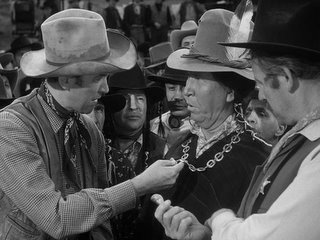
“Looks like another miss”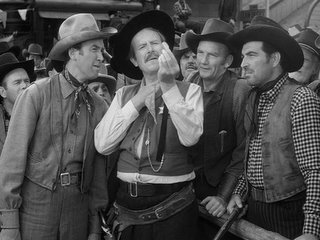
"I wouldn’t wanna say you’re wrong, Marshal, but I didn’t miss it." 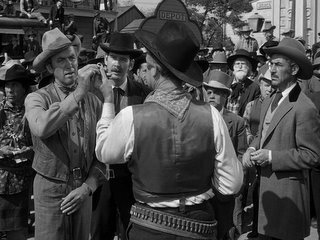
"I don’t see any mark, except maybe this scratch on the inside rim." 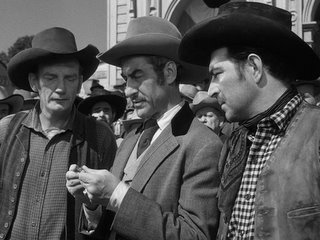
"That was my mistake. I shot through it."
Yeah, sure you did, you lying son of bitch!….or so I thought. But he proved me wrong with a postage stamp.
Still, winning the Winchester is not the same thing as keeping the Winchester. His bad seed bro lays out for him in the hotel room and steals it.
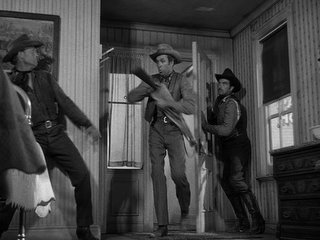
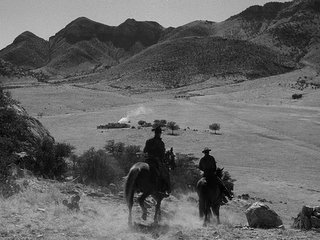 Everybody goes to Riker’s.
Everybody goes to Riker’s.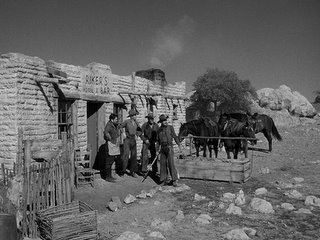 Dutch Henry Brown has the rifle, but not much else. There’s scuttlebutt that the indians are on the war path since the victory at the Little Big Horn (which would've happened 3 years after the story, but I digress)[actually, as the comment below the post points out, the shooting contest was in 1876, evidenced by the screenshot of the rifle behind glass, not 1873 as I assumed, so the historical timeline is accurate]. His posse needs guns. They meet a gun peddler (John McIntire) at Riker’s. He’s got a deal with some indians. If Anthony Mann pictures teach you anything, it’s that you should never sell repeating rifles to indians – especially when they're on the warpath. Yet, the peddler is like a cockroach, an inevitable opportunist.
Dutch Henry Brown has the rifle, but not much else. There’s scuttlebutt that the indians are on the war path since the victory at the Little Big Horn (which would've happened 3 years after the story, but I digress)[actually, as the comment below the post points out, the shooting contest was in 1876, evidenced by the screenshot of the rifle behind glass, not 1873 as I assumed, so the historical timeline is accurate]. His posse needs guns. They meet a gun peddler (John McIntire) at Riker’s. He’s got a deal with some indians. If Anthony Mann pictures teach you anything, it’s that you should never sell repeating rifles to indians – especially when they're on the warpath. Yet, the peddler is like a cockroach, an inevitable opportunist.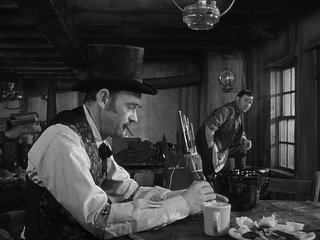 If you never thought that Rock Hudson would don redman blackface and scalp your sorry ass, well you better think again. He ends up getting the rifle off the peddler.
If you never thought that Rock Hudson would don redman blackface and scalp your sorry ass, well you better think again. He ends up getting the rifle off the peddler.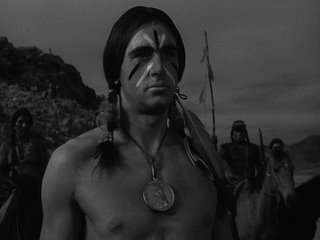 While Lin (Stewart) trails his bad bro and the rifle, the rifle changes possesion countless times. A few of its brief keepers:
While Lin (Stewart) trails his bad bro and the rifle, the rifle changes possesion countless times. A few of its brief keepers:Young Bull – apparently he earned his name by claiming he was an indian.
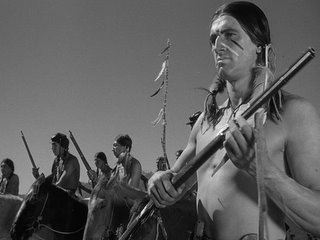
Steve Brody – he was never man enough to have the Winchester in the first place. He’s plagued by a yellow streak. On his arm is Lola Manner (Shelly Winters). Poor bastard, his rifle is too much gun for him and his fiance is too much woman for him. And see the white horse in tow?
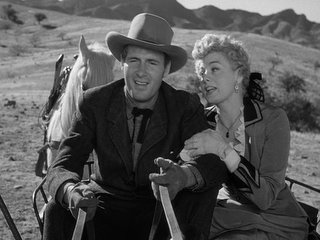
Waco Johnnie Dean (Dan Duryea) –
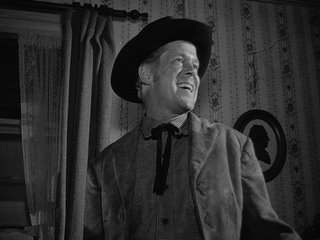 at first glance, he’s just a wild brute, but because he’s the only character smart enough to understand his place in the food chain, well, that makes him pretty much the deepest character in the picture. Dan Duryea is one hell of an actor and the cocky S.O.B. steals every scene he’s in, which is quite an accomplishment as the film is brimming with excellent performances.
at first glance, he’s just a wild brute, but because he’s the only character smart enough to understand his place in the food chain, well, that makes him pretty much the deepest character in the picture. Dan Duryea is one hell of an actor and the cocky S.O.B. steals every scene he’s in, which is quite an accomplishment as the film is brimming with excellent performances.The film ends with the good brother chasing the bad. See the giant cacti?
 Those things are crawling all over Kansas.
Those things are crawling all over Kansas.The climax is a rifle duel on the side of a mountain:
“…The old man told you never to waste lead! Now you’re short!" Lin says to his evil brother.
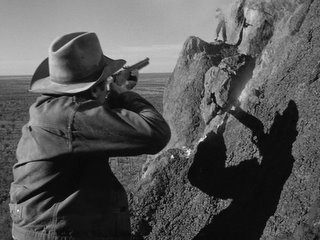 End picture.
End picture.What makes Winchester ‘73 so worthwhile in the end isn’t some chase after an adult themed western, but its purity within the genre. Winchester ’73 doesn’t pretend to be ambitious, but it’s expertly paced. For a 90 minute picture, it packs it all in: good shooting, nice scenery, lots of horses, indians, gamblers, thugs, cheats, dancers. Every time there’s a change in the film, the audience is taken to a new scene in medias res. The indian menace, as in many Mann pictures, plays out largely off screen. By the time the main characters face the menace for the first time, it's when they stumble upon an army unit that's already near the end of a Zulu-like siege. Unlike most recent westerns, all the action and multiple characters doesn’t bog down the film. It remains streamlined and focused and ends with one clearly defined climax. Realism doesn’t have a place in Winchester ’73, but nevertheless, Mann’s west is richly textured and full of life. Once “The End” flashes on the screen, you know you’ve really seen a western.
"Cowboy Leg Beautiful Pole"
Wednesday, March 08, 2006
Edward Copeland needs a check up from the neck up
Why is it that as time rolls along, the Bush Administration resembles more and more the supposed bad guys in the world? They endorse the same propaganda techniques and media suppression as communist regimes like China. They try to create a Christian theocracy in the U.S. with as much zealotry as Islamic ones they fight against. Why do they use the excuse of "terrorism" to spy and try to silence people who would dare to oppose their policies like Quakers or government whistle-blowers who know that what is going on is very wrong? Enough is enough. I love America and I worship the Constitution -- it's time that the rest of the country demand the same from its government and fight this assemblage of incompetent crooks, zealots and power-mad charlatans at every opportunity and at every chance they get.
Boy, howdy! Mr. Copeland has shown incredible ignorance about the methods and extremes the People’s government engage in on a routine basis to provide “guidance” to its media. To claim that there isn’t an ocean-sized gulf between our government’s policies and respect for freedom of the press and China’s policies of shutting down websites, telling papers what to print, ransacking pressrooms that don’t abide by their directives, imprisoning journalists for purely political reasons, etc. is an insult to every single reader that checks his site. Copeland’s belief that Bush is creating a Christian theocracy at all comparable to Saudi Arabia or Iran is equally ignorant. Based on Copeland’s comments, I doubt he’d be able to tell the difference between Auschwitz and Amache.
My original post containing the relevant Chinese comments is here.
Tuesday, March 07, 2006
PATRIOT Act sails through Congress
Gordon Parks - R.I.P.
Monday, March 06, 2006
James Carroll lacks the depth to be even a hack columnist
A week after the AP Katrina story was debunked, James Carroll uses it to press on with his anti-Bush bile. He tries to be transparent, though:
“Critics of the president (among whom I must be counted)”-you don’t say?
His column brands the President as a liar based on the Katrina video and then delves into Bush as a fictional character named “Bush”– using the fake but accurate rationale that has so infected the left. Does Bush lie and feel guilty? Does he unconsciously block the truth? Those are the probing questions Carroll poses. But, he concludes that the President lacks the depth to be a fictional character.
“From all appearances, the president is not a candidate for the role of ''Bush"because a narrative that unfolds across the terrain of an inner life requires an inner life, and Bush shows no sign of having one.”
Since I’m not a journalist, I guess I don’t know how papers work. Do columnists have editors that can stop this kind of garbage from soiling their rag?
Sunday, March 05, 2006
Four-legged Robotic Pack Mule
The Simpsons
Steyn on how the Patriot Act has been used...
I had to sign a tedious business contract the other day. They wanted my corporation number -- fair enough -- plus my Social Security number -- well, if you insist -- and also my driver's license number -- hang on, what's the deal with that?
Well, we e-mailed over a query and they e-mailed back that it was a requirement of the Patriot Act. So we asked where exactly in the Patriot Act could this particular requirement be found and, after a bit of a delay, we got an answer.
And on discovering that there was no mention of driver's licenses in that particular subsection, I wrote back that we have a policy of reporting all erroneous invocations of the Patriot Act to the Department of Homeland Security on the grounds that such invocations weaken the rationale for the act, and thereby undermine public support for genuine anti-terrorism measures and thus constitute a threat to America's national security.
And about 10 minutes after that the guy sent back an e-mail saying he didn't need the driver's license number after all.
He ain’t no short-term lip-biting President
 (picture via Lucianne)
(picture via Lucianne) If you looked at the Washington Post’s website last Thursday, you likely saw their lead photo of Bush’s burning effigy in India(sorry, no link) – that being about the only burning bush the left seems to acknowledge. You’d think from all the talk of protests that Bush was less popular in India than he is in the US, but not so, according to the CSMonitor and [cough] CBS “News.” So it’s a shame that the Post's photo of the burning Bush is worth a thousand words, since in this case it is a thousand misleading words. A better lead photo would have shown that his trip to India was much much more than the tight security measures taken and several thousand protestors that hit the Indian streets.
I noticed bloggers like Edward Copeland and several papers started last week like they do most weeks, drooling over the prospects of an Iraqi civil war and salivating over an embarrassingly dishonest AP rehash of Katrina. Anything to suggest that President Bush is incompetent, stupid, uncaring, self serving, evil or any combination thereof is what matters, right? Meanwhile, plagued by low and suspect poll numbers showing Bush and his policies in a weakened state, he went about last week as he does most weeks, orchestrating the tectonic shifts of US diplomacy that will save our ass down the road.
We ceased punishing India for developing nuclear weapons, agreed to sell them nuclear fuel and share nuclear technology as well as clean coal technology. From an environmental standpoint, if this agreement reduces burning dung emissions in India, it may do more to clean the air than the Kyoto Protocol could ever hope to do. But more importantly, security wise, Bush didn’t let the antiquated 1970 Cold War Era Nuclear Non-Proliferation Treaty stand in the way of acknowledging reality. Critics griped. In fairness, Bush’s critics want to make changes to the treaty in order to make it more effective (excessive scrolling required to find the relevant passage). Well, in a broad sense, Bush got the ball rolling and did just that. Whether the specific treaty will change and survive and accommodate India or whether it will dissolve and be replaced with something else or nothing at all remains to be seen. Whatever happens, it will no doubt be more representative of this day and age. Treaties and alliances, as nice as they sound, are not meant to last forever and when you try to preserve them past their due date, expect disastrous results.
The other complaint is that we are revealing a double-standard. How can we wheel and deal with India while they develop nukes and not deal with Iran? Why can’t we block both countries, equally, from ushering in an era of black rain? To that sentiment, I offer a fat wet raspberry. Here’s the message for Iran: look at India, they’ve got an antiquated caste system, border disputes and internal dissension – that’s not much different than you. But because India is democratic and genuinely looking to join the global market to develop a prosperous and more open economy – and because they do not openly suggest that they would destroy their neighboring states – the U.S. will befriend them.
Iran, on the other hand, is actively stifling freedom among its citizens, fueling the instability in its neighbors (near and abroad), threatening the destruction of Israel and bearing false witness against the character and deeds of the U.S. Put away any artificial ideals you may have of “equal” treatment and ask yourself which nation is more responsible to handle the bomb?
Proliferation is a reality and won’t be stopped by paper. In that way, the NPT is like any other arms treaty. That doesn’t mean it was never useful, but treaties are what they are. The double standard, in this case, allows Bush to help a friend and hurt the plans of an enemy at the same time. Double standards can be just and good.
I’m sure some critics believe that the agreement will spark an arms race in the region, that Iran will double its efforts of its program. However, that may be difficult if Russia quits them and opts for more lucrative Indian contracts, which is a possibility. Who knows? The main point, however, is that ultimately we will end up with a more solid democratic ally in Central Asia, which is not a bad thing when dealing with Iran or China.
The double standard came in handy with Pakistan, too. When Bush arrived there, they wanted the same deal that India got. Bush was respectful and frank. He said no. He also wisely refused to mediate in the Kashmir dispute (I can envision a Zakaria column lamenting that) yet still encouraged Musharraf to keep on track for elections in 2007.
Finally, there’s the line that Bush is going to have a tough sell getting the Indian agreement approved by Congress. Sure, he may have to twist an arm or two, but what’s going to happen to that line in a few months when we have a port deal as well as this Indian agreement? I would’ve thought that after Senator Reid celebrated the murder of the Patriot Act that that would’ve been a tough sell. But a few delays and concessions later, Bush got what he wanted, 89-10. For an incompetent leader who has to deal with a cowardly weather vain Congress, he still manages to get what he wants on these types of issues. I don’t see this as being a tough sell.
So it was a good trip all the way around and Bush deserves credit for improving ties to India, making environmentally friendly fuel deals and still maintaining good relations with Pakistan and Afghanistan. Did he somehow find Kerry’s magic wand?
Saturday, March 04, 2006
Altman's Nudes

The sexiest shot in Altman. I prefer it to Marilyn's "Isn't it delicious" air-blast in The Seven Year Itch.
 Here begins the theme of nakedness and humiliation.
Here begins the theme of nakedness and humiliation.

 Here is a painterly triptych. I can almost smell the dirty woolen socks in this brothel.
Here is a painterly triptych. I can almost smell the dirty woolen socks in this brothel. The One-Armed Piccolo Player.
The One-Armed Piccolo Player. Altman likes to repeat these stray glimpses of his leading men. Keith Carradine plops his fanny down in front of the television.
Altman likes to repeat these stray glimpses of his leading men. Keith Carradine plops his fanny down in front of the television. Yeesh. I don't know which feels more painful and degrading to watch, this or Julie Andrews in S.O.B.
Yeesh. I don't know which feels more painful and degrading to watch, this or Julie Andrews in S.O.B. This scene brings to mind Faye Dunaway's very calculated nudity in Chinatown.
This scene brings to mind Faye Dunaway's very calculated nudity in Chinatown. A Hollywood Mud Monster.
A Hollywood Mud Monster.
 There are always layers in Altman to undercut any titillation. Altman made an anti-western. He also makes anti-nude scenes. Can we derive pleasure watching him watching her pretending to be dead for her mother, who's watching?
There are always layers in Altman to undercut any titillation. Altman made an anti-western. He also makes anti-nude scenes. Can we derive pleasure watching him watching her pretending to be dead for her mother, who's watching? Awfully sporting of Huey Lewis. What was it rock groupie Pamela Des Barres said about him?
Awfully sporting of Huey Lewis. What was it rock groupie Pamela Des Barres said about him? Nude ... and dead.
Nude ... and dead. Pretty as a picture. The sisters share a giggle afterwards at husband Modine's awkwardness.
Pretty as a picture. The sisters share a giggle afterwards at husband Modine's awkwardness. The audience pretends not to notice Julianne's flaming bush the way the characters pretended not to notice that hurricane in The Gingerbread Man.
The audience pretends not to notice Julianne's flaming bush the way the characters pretended not to notice that hurricane in The Gingerbread Man.
 The only idea in Preta-a-Porter's pretty empty head.
The only idea in Preta-a-Porter's pretty empty head. Kenneth Branagh wakes up next to a Nude, then remembers he is late to his acting exercise.
Kenneth Branagh wakes up next to a Nude, then remembers he is late to his acting exercise.There are few shots I wish I could post but couldn't find, so this is far from comprehensive. Maybe I can add them later when I have more time.
In Brewster McCloud, avenging angel Sally Kellerman is nude in a fountain. Also, Bud Cort's surprisingly defined torso seen while doing chin-ups reminded me of the buff Buster Keaton whenever we see him shirtless.
I think I remember a bevy of topless party girls living across the way from Marlowe and his cat in The Long Goodbye.
Haven't seen Dr. T and the Women, but given the subject matter I'd be shocked if there wasn't nudity.
Did Vincent Van Gogh paint nude models in his little brown studio?
I've seen fewer than half of Altman's movies, but I think it's a safe bet that Shelley Duvall is naked in there somewhere.
Please let me know of any glaring omissions.
A few tentative thoughts: When it comes to nudity, Altman is an equal opportunity employer, at least by normal Hollywood standards. Be they female or male, young or old, pretty or plain, he doesn't shy from filming. I discovered that many of these shots don't work as stills. Especially 'Hot Lips' getting off the chopper. There's a reason they call them moving pictures. Also, I find that the attitude behind a few of these shots disturbs and makes me uncomfortable. Somewhere I once heard Martin Scorsese say that he didn't shoot nude scenes. It seemed like he took some pride in this. That struck me as odd, somehow, and perhaps not good. Why is he so comfortable with violence, but not with nudity? Robert Altman on the other hand has used nudity many times, but there is always something willfull and contrarian about it. So what's going on with Altman and nudity? Any patterns? Any thoughts?











.jpg)





